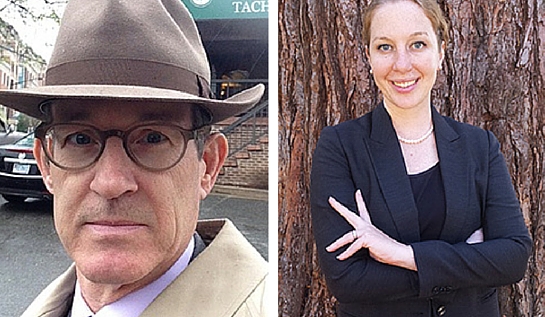Woodward, Klinger Join Pardee School Faculty
The Frederick S. Pardee School of Global Studies is pleased to welcome to its faculty two new members – John Woodward, Professor of the Practice of International Relations, and Julie Klinger, Assistant Professor of International Relations.
“We are delighted to welcome these two new colleagues to the Pardee School,” said Adil Najam, Dean of the Pardee School. “They bring scholarly expertise and professional experience in areas that are of great significance to the future of the world.”
Woodward is a former Central Intelligence Agency (CIA) officer. He has had an extraordinarily diverse background within the intelligence community, as an operations officer in overseas posts, as a policy analyst, as a designer of intelligence operations, and as a leader in the Directorate of Science and Technology. Functionally, he has spanned traditional intelligence gathering, intelligence law, and STEM-related work in biometrics and countering terrorism.
“At Pardee, I will teach courses related to intelligence studies, working in tandem with Professor Joe Wippl, a leading intelligence expert, and building on the trailblazing academic work done by my predecessor, Professor Art Hulnick,” Woodward said. “I hope my students gain an understanding of and appreciation for the role of intelligence activities in nations like the United States. Intelligence decisions are seldom black or white on the color spectrum, but mostly fall into the many shades of grey. As a lawyer and former public policy analyst, I hope to inject legal, policy, and ethical puzzles into my courses as well.”
Woodward is currently working on research regarding the intelligence services of the Northern and Southern armies in the American Civil War.
“John brings not only a deep expertise in intelligence studies, including cybertechnology and ethical dimensions, but as a trained lawyer will add an important dimension of international law to the curriculum,” Najam said.
“John Woodward has had an extraordinarily diverse career within the intelligence community, spanning traditional intelligence gathering, intelligence law, and STEM-related work in biometrics and countering biological weapons proliferation and terrorism. We expect that Professor Woodward will continue the Pardee School’s tradition of providing excellent, cutting-edge education in intelligence studies to our students,” said William Grimes, Pardee School Associate Dean. “He will also help us to expand that education into cutting-edge issues of intelligence, national security policy, and law. He will pioneer new courses that bring together the Pardee School’s strengths in intelligence studies with Boston University’s distinctive capabilities in STEM, public health, and law.”
Klinger specializes in development, environment, and security politics in Latin America and China in comparative and global perspective. A native of Illinois, she has taught on critical issues intersecting concerns of sustainability, gender and race, and completed fieldwork on sustainable development in the Himalayas and the Brazilian rainforest.
“My research in the Chinese Himalayas focused on the question that plagues so much sustainable development; why do big projects with beautiful ideas behind them so often fail when it comes to improving environmental outcomes and alleviating poverty?” Klinger said. “What we find so often is that in the world of development, the people who craft policy are the ones with the least proximity to events on the ground. I hope to train students to go out and get their boots muddy, so they cultivate a sense that the work of development is not just done in offices.”
She is currently completing a book project on the global geography of rare earth prospecting and mining, with a special emphasis on the development and geopolitics of resource frontiers in Brazil, China, and Outer Space.
“Julie Klinger adds to our already-impressive strengths in two critical areas – China and Latin America – and in the areas of international development and resource management,” Najam said.
“Dr. Klinger exemplifies the type of interdisciplinary, policy-relevant research that the Pardee School takes as its mission. Her work on the global geography of rare earth mining, with a particular focus on Brazil and China, uses the theories and methods of geography, economics, and politics to analyze the global division of toxic labor. This is groundbreaking scholarly research, but it is also of great practical significance, given the growing importance of rare earths in energy, defense, and information technologies,” Grimes said. “Perhaps the most extraordinary thing about Professor Klinger is her mastery of Portuguese and Chinese, which has allowed her to live with, observe, and interview peasants and miners in both Brazil and China. Professor Klinger thus provides a window into global extraction and trade in commodities that concentrates on the lives of the people most affected by it, offering a bottom-up analytical alternative to the many studies that begin from a top-down analysis of production statistics and government policies.”
